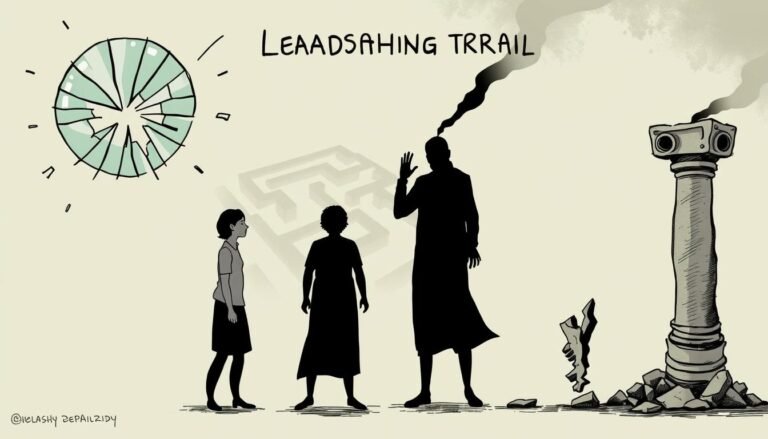Ethical Decision-Making and Corporate Social Responsibility in Irish Firms
Picture yourself at the Cliffs of Moher, with strong wind and waves. These iconic cliffs symbolize lasting strength. Similarly, Corporate Social Responsibility (CSR) in Ireland has grown stronger and improved its business world. It’s not just about big donations or flashy campaigns anymore. Now, acting ethically and caring about the planet is at the heart of what Irish businesses do.
In Ireland, Corporate Social Responsibility has a long history of development. It started with big companies giving back, and now it’s part of their everyday plans. As shown in Table 1, Irish companies now deeply connect CSR with how they do business.
Table 2 shows how different companies in Ireland view social responsibility, from doing the minimum to actively supporting social issues. It’s interesting to see these views in action through Irish companies’ many CSR projects.
Studies, like the ones tackling questions Q6, Q7, and Q8, highlight how crucial leadership is in making ethical choices. Good leaders not only guide but build a strong ethical approach. They make sure CSR is put into action well.
There’s also Stephen Clarke’s work showing how essential CSR is for a company’s strategy. By studying Q16, Q17, and Q18, Clarke found that making CSR a core part of business can have many benefits. This includes a better brand and happier employees.
Key Takeaways
- Corporate social responsibility in Ireland has evolved through different phases and is now deeply integrated into business strategies.
- 70% of Irish firms address workplace diversity and discrimination as top ethical concerns.
- 85% of Irish firms prioritize environmental responsibility, infusing sustainability into their operations.
- Strong leadership is critical for effective CSR and ethical decision-making in Irish firms.
- Strategic CSR leads to significant benefits, including improved brand image and better employee engagement.
- Research emphasizes the need for greater exploration of Irish-specific CSR practices to understand diverse organizational approaches.
- By embracing CSR, companies can support sustainable development and strengthen social bonds in Ireland.
Introduction to Business Ethics in Ireland
Business ethics is crucial for a company to succeed. It forms the basis for how a company acts and the moral principles it follows. In Ireland, knowing and using ethical principles is key. It helps businesses build a strong moral base, which earns trust from others.
What is Business Ethics?
Business ethics is all about using morals and values in the workplace. In Ireland, seven main principles guide this:
- Honesty: Being truthful and transparent in business.
- Integrity: Keeping high moral standards all the time.
- Fairness: Making sure everything is just and equal.
- Responsibility: Aware of the effects of its decisions on everyone involved.
- Respect: Appreciating the dignity and rights of all people.
- Citizenship: Giving back to the community and caring for the environment.
- Sustainability: Aiming for a healthy planet and society for the future.
The Importance of Business Ethics
In Ireland, being ethical is extremely important. It helps build trust and a good reputation with others. For Irish companies, focusing on ethics shapes how they interact with people inside and outside the company.
Acting ethically boosts a company’s image. It can draw in new investors and customers. This also means the business is more aware of how it impacts society and the planet. So, it helps with long-term economic growth.
Using ethical business practices is good for everyone. It follows the spirit of ethical decision-making in Ireland. This means companies do business in a way that is right for the community and the environment.
Corporate Social Responsibility (CSR) in Irish Firms
Corporate social responsibility (CSR) is key for Irish businesses. It influences both the economy and how well society does. The CSR Check 2019 report shows Ireland’s progress in CSR. This is from ‘Towards Responsible Business,’ a plan in place since 2017.
CSR Hub Ireland and Business in the Community Ireland are important. They help Irish companies with CSR info, like sample reports. This helps businesses, especially small ones, connect better with their communities. The Business Working Responsibly Mark also helps. It checks and certifies businesses that work responsibly and sustainably.
Recent research found that many UK shoppers choose Irish products based on their social impact. Employees also want to work for companies that do good. They see CSR as key to their well-being and career growth.
Irish companies choose CSR for many reasons. These include being ethical and having a good reputation. They also think about teaching their staff and helping their local communities.
Looking at how Irish firms do CSR, some bright examples stand out. They set clear goals for their CSR and make sure to share what they do. They invest time, care, and money in local projects to help their communities.
Irish companies are big on making a positive difference in many ways. They care about the environment, social issues, and who they include in their work. Supporting these areas helps promote good CSR in Ireland. And it’s good for everyone. Not just the companies but society too.
Irish businesses keep working on being ethical and responsible. They believe in being open to everyone, as well as doing the right thing. This helps them do better and make society overall better too.
In the end, CSR in Ireland keeps getting better. The country follows global ideas and its own plans to make a real difference. This is good news for everyone touched by what Irish companies do.
The Role of Sustainability in CSR
Irish businesses are now focusing on sustainable business practices in their corporate social responsibility (CSR). This isn’t just a fad. It has become a key part of how businesses in Ireland operate. By linking their goals with sustainable actions, companies are stepping up to their environmental responsibility in Ireland.
Environmental Impact
Studies show many Irish companies are adopting sustainable ways. They are teaming up with non-profits to meet their goals in a green way. This shows the value of strong relationships, getting the team onboard, and having clear plans.
| CSR Initiative | Environmental Impact | Long-term Profitability |
|---|---|---|
| Partnership with Non-profits | Enhanced local environmental projects | Strengthened community ties |
| Adherence to EPA Regulations | Reduced environmental penalties | Lower operational risks |
| Investment in Renewable Energy | Decreased carbon footprint | Improved market competitiveness |
Notable cases, like the EPA enforcing regulations, show the key role of strict rules in environmental responsibility in Ireland. When businesses follow laws on waste and climate, they support the nation’s environmental aims.
Long-term Impact on Business Strategy
In addition to helping the environment, sustainable actions bring benefits for CSR and profitability. It’s found that investors like putting money into eco-friendly businesses. They see it as reducing risks and enhancing success over time. Also, more people want to buy from companies that act ethically. This improves a company’s image and keeps customers faithful.
Today’s tech changes how businesses affect the environment. Apple’s situation in Athenry is a clear example. It shows the importance of handling environmental and community issues with care. Working together, business leaders and policymakers bring about a culture that supports a green future. It meets environmental responsibility in Ireland while ensuring lasting victory.
Stakeholder Engagement and Corporate Governance
Stakeholder engagement and strong corporate governance are very important in business. This is especially true in Ireland. There, the focus on doing business ethically and with good governance is key for success over time.
Importance of Stakeholder Engagement
Trust from stakeholders shapes how Irish companies act. When companies support social causes, like with the Business Working Responsibly Mark, they boost their image. This leads to better relationships with stakeholders. It can help a business attract the best employees, make customers more loyal, and increase earnings.
To engage stakeholders well, companies need to listen to them and use their feedback. This makes their actions more transparent and accountable. It helps them make more ethical decisions. It also makes them more innovative. They start offering products that are good for society. They also start using less energy and producing less waste.
Corporate Governance Standards
In Ireland, there are strict rules for how companies run. The Business Working Responsibly Mark, for instance, looks at how a business handles its money, cares for the environment, treats people right, and is honest. These rules help companies act with honesty, equality, and openness.
Irish businesses pay a lot of attention to good governance. They check their departments, the culture in the company, their strategies, how they follow the rules, and if they do what they say they will. Companies keep up with these rules by reviewing them and making them better over time. It’s important to note that many companies in Ireland share more about their social, environmental, and governance actions than they have to by law. This shows how much they care about keeping the trust of the people who believe in them.
Making sure their business practices are ethical and following good governance helps Irish companies be good for the community and grow the local economy. This effort is crucial to their long-term success. It makes people trust them more.
Human Rights and Community Development in Ireland
In Ireland, firms are making sure human rights are respected while they help build communities. They mix corporate human rights initiatives with community projects. This way, they show they are serious about being ethical. Laws and rules are pushing them to do even more, setting up detailed guides for them to follow.
Human Rights Initiatives by Irish Firms
Irish companies are starting to follow the United Nations’ guidelines on business and human rights. Since 2011, these rules have pointed the way on how companies should act responsibly. These businesses are now promising to protect human rights and are checking themselves regularly. They have also made it easy for people to raise concerns about human rights abuses.
For example, there’s a new rule from 2021 that makes companies check their supply chains for issues like human rights abuses. And big companies now have to regularly talk about how they are doing on human rights, the environment, and fighting corruption.
Businesses in Ireland are not waiting to be told how to help. They are getting ahead by supporting plans that the EU wants to make mandatory on human rights and environmental protection. They see that being responsible makes people think of them more highly.
Community Development Practices
Helping local communities is really important for businesses in Ireland. There’s a lot of information out there like “Community Work Ireland (2015) In whose interests?” It talks about both the good and bad parts of helping communities in a fair way.
Companies are doing a lot to help out. They are backing education, putting money into community activities, and promoting health. The National Plan on Business and Human Rights has brought companies and the local community closer together. This plan highlights working together on common goals.
The following table outlines key initiatives and their focus areas:
| Initiative | Focus Area | Impact |
|---|---|---|
| Education Sponsorship | Youth Development | Increased educational attainment and career opportunities for young people |
| Health and Wellness Campaigns | Community Health | Improved health outcomes and awareness |
| Community Events | Social Cohesion | Enhanced community engagement and collaboration |
| Competitive Tendering Practices | Social Inclusion | Promoted fair opportunities for diverse groups |
By working closely with local groups, the Irish business community contributions make their efforts even better. This partnership improves the impact of their work and helps the companies look good for caring about the community.
Transparency and Accountability in Corporate Practices
Corporate transparency in Ireland and accountable business operations are really important today. Ireland faced many accountability issues in the past year. The government stepped in to fix problems, especially in finance and media. Making decisions openly and reporting clearly helps create ethical workplaces.
Measures for Ensuring Transparency
Organizations should follow certain steps to report ethically and be clear:
- Ethical guidelines and codes of conduct matter a lot for proper business behavior.
- Whistle-blowing policies let employees report bad actions without fear.
- Training using real-life scenarios helps employees deal with tough ethical choices.
- Performance management processes make sure everyone is responsible for their work.
The Central Bank of Ireland is also making senior leaders more accountable for their actions. They are making sure these leaders know what they should be doing.
Accountability Mechanisms
Key to creating a accountable business culture are these important points:
- Consistent application of consequences – The rules should be the same for everyone, no matter their position.
- Legal frameworks and regulatory systems provide the strength to enforce accountability.
- High ethical standards are essential, especially in banking, said Justice John Hedigan of the IBCB.
Following global standards like GAAP and IFRS makes financial reports clear and consistent. This contributes to corporate transparency in Ireland. Sticking to these rules avoids legal troubles and protects investors. It shows how important being clear and honest is in business.
Groups like the Central Bank of Ireland and companies following ethics help keep reporting standards ethical. This helps create a business world in Ireland that is more open and accountable.
Case Studies of Ethical Decision-Making and Corporate Social Responsibility in Irish Firms
Examining ethical Irish companies involves looking at real examples. These show how companies make Corporate Social Responsibility (CSR) a part of their foundation. Allied Irish Bank (AIB), for example, has over 200 branches all over Ireland. They show their strong commitment to CSR through programs like the Future ME. This program helps students learn how to manage money. AIB also works with University College Dublin (UCD) to promote research and innovation, helping the community and economy.
The Bank of Ireland is another great example. In 2016, they put €2.8 million and more than 1,000 days of volunteer work into the community. They believe in the power of education, running the BoI School Bank Program and the Bank of Ireland TY Academy. Since 1783, the Bank of Ireland has served Ireland, the UK, Europe, and the US. This shows their broad impact and commitment to society.
Looking at CSR efforts in different fields shows common ground. For example, three big companies in Ireland share similarities in their approach to CSR. However, they also face unique challenges. This shapes how they meet CSR standards. Physical and operational differences are key.
- AIB works with Dublin City University (DCU) on data analytics.
- The Bank of Ireland is deeply involved in community and volunteer work.
- Both banks’ education programs greatly help Ireland’s development.
Evidence shows Irish companies need to do more than just obey law. They must truly care for all those they affect as they grow. This makes strong CSR strategies more crucial.
To sum up, Irish companies are leading the way in ethics through their CSR work. They focus on education and the community. These efforts not only improve their reputation but also help society grow.
Challenges and Opportunities in Ethical Decision-Making
Ethical decision-making in Irish firms battles tough challenges yet shows many chances for betterment. Companies in Ireland face CRC issues since over 100 million tonnes of materials are used each year. Lots of this waste goes to landfills or is burned.
There’s also a global issue with harmful subsidies, up to €1 trillion a year. These subsidies misguide companies towards unsustainable paths. They make it hard to choose greener, better options. To deal with these problems, businesses need to stand by high ethical standards. They must work on their ethics, fitting advice from experts like Clarke & Dela Rama (2006) and Sikka (2015).
Key Challenges Faced by Irish Firms
Irish companies are finding the new EU law from 2018 demanding. This law says big companies must report on their social and environmental work. It aims to make businesses more open, which is good, but it also adds a lot of extra work.
Another tough challenge is to follow the UN’s goals for a better planet. By 2030, companies should be greener, use fewer resources, and be more careful. This is hard with a growing world and bigger promises to fight climate change. And, to stand out, companies must always find new ways to be better and stronger.
Opportunities for Improvement
Although challenges are big, there are many chances to do better. The idea of Green Public Procurement (GPP) lets businesses offer earth-friendly goods and services. Using the EU Commission’s push for an environmental tax can fix some market problems. It can cut down bad subsidies and support eco-friendly investments.
To make better choices, companies can use self-reflection. This advice comes from Crossan et al. (2013) and from Werhane (1998), who say companies should always question themselves. Also, pushing for equal pay, fairness, and honest research helps build a strong ethical base. These steps will not only fix CSR issues but will also make Irish CSR plans stronger.
FAQ
What are the main themes of ethical decision-making and corporate social responsibility (CSR) in Irish firms?
Irish firms focus on blending CSR into their plans and the big role it plays across different fields. They consider the firm’s size and power, what the public wants, and what stakeholders need. Research shows that CSR makes societies better off and helps the economy grow.
What is business ethics?
Business ethics are based on seven key ideas: honesty, integrity, fairness, responsibility, respect, citizenship, and sustainability. These form the basis for ethical and responsible business behavior. They highlight the need to care for both people and the planet.
Why is business ethics important for Irish firms?
Irish companies need strong ethics to build trust with their stakeholders and to guide their actions ethically. It’s essential for the long-term success of their business and to have a good image.
How is corporate social responsibility (CSR) implemented in Irish firms?
CSR in Ireland is part of the strategy and changes from one industry to another. It’s aimed at helping both the economy and society. Studies point to various ways firms in Ireland approach CSR, showing its positive impact.
What environmental impacts does CSR address in Ireland?
CSR in Ireland takes on numerous environmental issues through sustainability efforts. By lowering their impact on the environment, businesses help meet global environmental goals. This work also aims to ensure that businesses remain profitable for the long haul.
How does sustainability influence long-term business strategies in Irish firms?
Sustainability shapes how Irish firms plan for the future by connecting their environmental goals with their business plans. This approach helps companies tackle environmental problems while enhancing their reputation for being responsible. It ensures their lasting success, as explained in various insights.
Why is stakeholder engagement important for Irish firms?
Engaging with stakeholders is key for understanding and meeting their needs and expectations. By including stakeholders in decision-making, it builds trust and ensures the business acts ethically and responsibly.
What are the standards of corporate governance in Irish firms?
In Ireland, corporate governance sets the stage for ethical decision-making and practices. These standards make sure that firms are honest, transparent, and follow ethical rules. They help businesses keep their operations ethical and reputable.
What human rights initiatives are undertaken by Irish firms?
Irish businesses are active in protecting and enhancing human rights. They run programs that promote fair labor, equality, and dignity. These efforts cover their own activities and those of their partners in the supply chain.
How do Irish firms contribute to community development?
Firms in Ireland help their communities through actions that boost local economies and support essential services. They also invest in education and environmental initiatives. These programmes show the businesses’ commitment to making a positive difference in the places they work.
What measures ensure transparency in Irish corporate practices?
To stay transparent, firms report regularly, communicate with stakeholders, and follow ethical rules. They share important information openly and talk with people involved in their business. This helps keep their operations honest and open to scrutiny.
How do Irish firms maintain accountability in their business operations?
By doing internal checks, inviting external reviews, and obeying governance standards, firms in Ireland keep each other and themselves in check. They make sure their practices are ethical and correct any mistakes quickly. This helps maintain their trustworthiness and good standing.
Can you provide examples of ethical decision-making and CSR in Irish firms?
Yes, many Irish firms are standing out with their strong ethical and CSR efforts. Their stories include in-depth CSR plans, active stakeholder involvement, sustainability, and community support. These practices showcase how theory turns into real, impactful actions.
What challenges do Irish firms face in ethical decision-making?
Irish companies often struggle to find the right balance between making money and acting ethically. They also have to meet the varied needs of their stakeholders in a complex regulatory environment. To thrive, they must continually improve their approach to these key challenges.
What opportunities exist for improving CSR and ethical decision-making in Irish firms?
Bettering CSR and ethical practices in Ireland means enhancing how firms work with stakeholders, adopting sustainable methods, and using new tech. It’s a chance to see strategic improvements and to contribute positively to society at the same time.
Source Links
- Ethics in Action: A Guide to Business Ethics for Irish Startups
- Corporate Social Responsibility in Ireland: Meaning & Examples
- Business Etiquette
- Corporate Social Responsibility (CSR) | ISME
- Corporate Social Responsibility Leadership – when doing good is good for business.
- Corporate Social Responsibility | NFP
- Corporate Social Responsibility
- Is Sustainability the New Advantage in Ireland’s Corporate Sector?
- What are the 4 Types of Corporate Social Responsibility? –
- Corporate Social Responsibility and Corporate Governance
- Community Development, Policy Change, and Austerity in Ireland
- Championing accountability through organisational culture
- Transparency and Ethics in Ireland
- The Role of Financial Reporting Standards in Corporate Transparency and Accountability
- Microsoft Corporate Social Responsibility | Microsoft CSR
- Ireland’s Environment: Sustainable Economy
- A Framework for Authentic Ethical Decision Making in the Face of Grand Challenges: A Lonerganian Gradation – Journal of Business Ethics
- Ethical decision making in the 21st century: A useful framework for industrial-organizational psychologists | Industrial and Organizational Psychology | Cambridge Core








